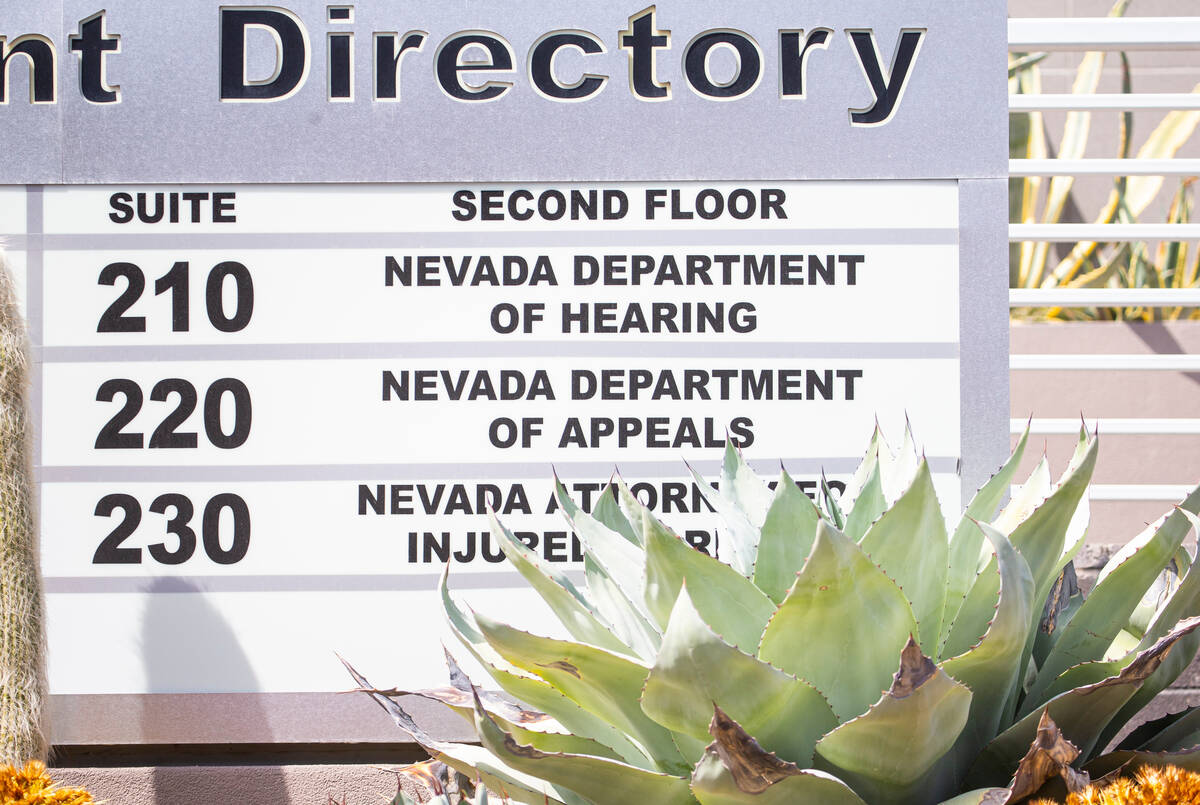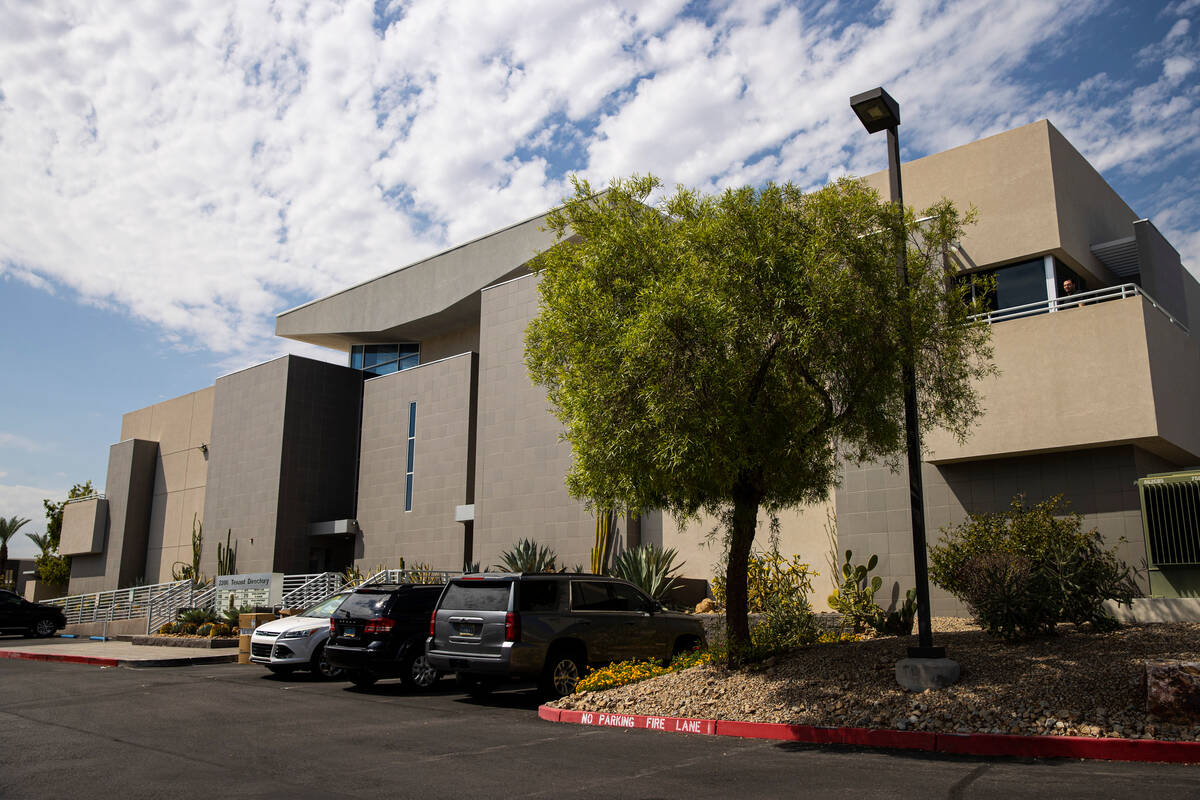‘Utter and complete shambles’: Injured workers wait months to receive care
In 2020, 61-year-old Jane Smith injured her back while driving for work. She still lives with the pain every day as she waits for her worker’s compensation case to be resolved so she can get treatment.
She used up all her sick days, so she has to go to work. Every day, she takes pain relievers and soaks in two hot baths before and after work to manage the pain. When she goes to the grocery store, she has to use a motorized shopping cart, and her neighbors have to help her around her house.
“It has affected my life tremendously,” she said.
Smith is one of thousands of injured workers who are waiting for their cases to get resolved. But because of massive case backlogs and — what several attorneys in the field allege — the appeals department not working as much as they should, thousands of people in Nevada are waiting for their necessary treatments.
The Department of Administration says there are 13,842 pending cases as of Aug. 18, although attorneys think there are more than that, around 20,000.
Smith is a pseudonym. Her attorney, who also asked to remain anonymous, feared revealing her identity could impact her case. Her attorney was also careful about revealing too many details about her story, worried that any detail could reveal who she is and cause a judge to rule unfavorably.
When Smith’s injury occurred two years ago, her insurance company sent her to the doctor for diagnosis but denied her claim.
When an employee gets injured on the job, their private insurance will not cover anything if they think the injury happened while working; instead, that worker first must apply for workers’ compensation.
“For two years, she hasn’t had any treatment,” Smith’s attorney explained. “If we win the case, she’s entitled to treatment under work comp. If we lose it, then she’s entitled to her treatment under her private insurance.”
Pending the resolution of the case though, she’s forced to live through the pain, her attorney said.
“It’s very disappointing,” Smith said. “Especially when you’re an employee who comes to work and does everything they ask of you, and then when you get hurt they don’t take care of you. You have to go through all these hoops to try to get help.”
The Las Vegas Review-Journal interviewed several attorneys in the field as well as an employee in the Nevada Department of Administration’s hearing division under the condition of anonymity about the backlog in the department, which handles the appeals that injured workers or their attorneys make when they get rejected for workers compensation, treatments or other issues.
The attorneys feared they would lose their clients’ cases if their identities were revealed, and the employees feared losing their job.
Backlogged
When COVID-19 hit, the hearings and appeals administrative court where the injured workers cases are heard shut down for two months, while other courts remained open.
But that, in part, caused a two-month backlog, and the department has still not caught up.
Attorneys say cases are supposed to be heard within 30 days and 90 days for appeals, but lately it is taking about three or four months for a hearing to even be scheduled. There are 3,000 cases that have not even been scheduled for a hearing yet, attorneys said.
An employee at the department, which has about 40 staff members, said the department head, Senior Appeals Officer Michelle Morgando, is often out of office, creating a lack of motivation among the employees and leading many to go home as well.
“There’s an overwhelming amount of work that has to be done,” the employee said. “So I think sometimes the amount of work and the flexibility allowed for some (employees) kind of create low morale.”
Attorneys concerned about the office’s productivity hired a private investigator to follow Morgando for three weeks in June and July and found that she was in the office only 34.6 percent of the time during public hours. About 65 percent of the time was spent out of the office, the investigation found.
“We know that the place is an empty ghost town most of the time,” one lawyer said. “If you walked into the building in the middle of the afternoon, it’s a public place, there’s no one in there.”
On June 28, Morgando left the office around 1 p.m. to go to a senior assisted living home, where she stayed for about 15 minutes before heading to a pet resort and then went home around 2 p.m.
Many days she arrived at the office around 8 a.m. and left in early afternoon, around 12 or 1 p.m. to head home, where she would stay the rest of the day. Some days she did not go into the office at all, according to the private investigator’s report. There were also many days where she would go to the same pet resort and stay for just a few minutes before leaving again.
Morgando declined requests for an interview, but Stephanie M. Klapstein, the public information officer for the Department of Administration, said in an emailed response to the Review-Journal that the department supports flexible work schedules and telework.
“Like the majority of employers during the pandemic, we learned out of absolute necessity to successfully implement more flexible policies for employees,” Klapstein said. “Our offices are open to the public and staffed during regular business hours. The appeals and hearing officers are available at any time should counsel need assistance.”
The department is also very well aware of the backlogs in cases and requested two additional hearing officer positions and two legal support staff positions, which were approved Aug. 17 , Klapstein said.
“These additional positions will allow the agency to schedule up to 160 additional hearings per week to gradually eliminate the backlog,” Klapstein said. “The hiring process for those positions is already underway.”
A deeper problem
But attorneys said the department is in “utter and complete shambles” and has been a “nightmare” before the pandemic. The system is “broken,” they said.
“Cases aren’t being heard. There’s no urgency,” one lawyer said.
Over the past five years, there has been a substantial increase in requests for hearings filed by injured workers and their attorneys, Klapstein said, as well as requests for hearings filed by insurers, employers or third-party administrators.
In 2017, the hearing officers had about 12 hearings scheduled per day, Klapstein said. Since then the rate has increased to about 20 to 25 cases a day, without leaving any room on the calendars for continuances.
“We used to be able to leave a day open for cases that needed to be reset, but we can no longer afford to reserve open dates,” Klapstein said in an email. “The backlog was, of course, compounded by the pandemic, when we ceased holding hearings during the early period of the shutdown, then transitioned to telephonic hearings and GoToMeeting virtual hearings for a period.”
The Nevada Industrial Insurance Act was created to ensure the “quick and efficient payment of compensation to employees who are injured or disabled at a reasonable cost,” according to Nevada statutes.
One lawyer said most of his clients do not have health insurance and are forced to go months with any sort of treatment. Health insurers should not lawfully be able to refuse to cover a person while their case is pending, but should be able to get compensation if the case is later found to be a worker’s compensation injury, one lawyer said.
“We’re in a stage where it will be three or four months before a hearing is even scheduled,” one lawyer said. “Imagine you have no benefits, no pay and can’t return to work because you’re injured and you have no health insurance.”
Working from home?
Lawyers say they have raised concerns, but no improvements have been made. They are told by the department that the staff is working remotely, but the nature of their job makes it difficult to take work home.
“I’m not trying to cause problems, but the reality is, the place is broken and the leadership has taken advantage of the people in the state,” one lawyer said.
The files the department works with include private data, such as medical information and Social Security numbers, so the files cannot be out of the office, an employee said.
Once a hearing has taken place, however, the hearing or appeals officer can use those files in the research for and drafting their decision and order, Klapstein said. That work can be done both in-office and remotely, she said.
“Some of our officers prefer the remote option, as it allows them to control for interruptions that would otherwise occur in the office, which means they can focus more efficiently on that work. So, work is absolutely getting done,” Klapstein said.
Morgando mostly oversees the appeals officers and does not handle many cases herself. She writes decisions on cases and responds to emails from home.
The problem goes deeper than just one person though, the employee said. When the boss is gone, others lose motivation or leave the office as well, the employee said.
“I think at this point it’s just gotten to the point where one person can’t fix it,” the employee said. “I know that issues have been raised with her in the past year and a half, and there’s never any action that’s taken to try to resolve any of the issues.”
The senior appeals officer is appointed by the governor every two years, but oftentimes the governor quickly reappoints the previous incumbent’s choice, one lawyer said, unless there’s some major issue. Morgando was appointed as the senior appeals officer in June 2018, according to the department website.
“I think that the agency looks at it as files when there’s, like, human beings tied to each one of these files, each one of these cases,” the employee said. “Regardless of if the attorneys are having a tiff with each other or something like that or the matter isn’t scheduled timely, there’s always someone who’s just kind of waiting. They’re waiting for some kind of money to go to them, some kind of medical treatment. I think sometimes that’s kind of lost in everything.”
After her lawyer argued her case more than a year ago, Smith is still waiting for a decision, favorable or unfavorable, to come forward so she can get back surgery and try to return to normal.
“This has altered my life a lot,” she said.
Contact Jessica Hill at jehill@reviewjournal.com. Follow @jess_hillyeah on Twitter.































